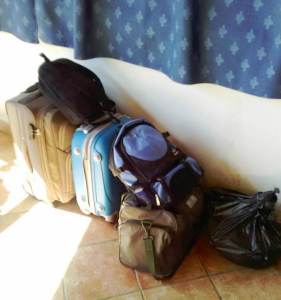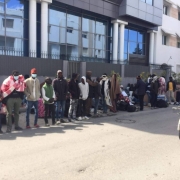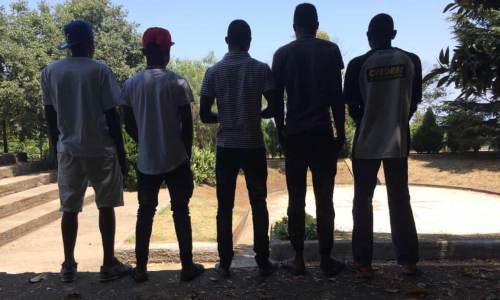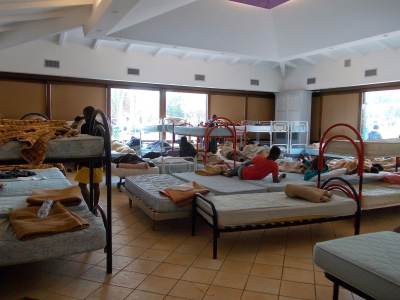Family Reunifications for Refugees: A Procedure only ‚alleviated‘ on Paper
Article first published on April 7, 2020
Our constitution protects the unity of the family, and this extends to people with refugee status as well as those whom subsidiary protection has been granted. This is what the law states, in Article 22 of the decree 251/2007, concerning the regulation of the awarding of international protection status and the particulars of the protection to be awarded.
However, this protection seems to exist on paper only. For persons with asylum status who have fled their countries due to serious personal persecution or situations of general violence, the regulation provides a simplified procedure for family reunifications with relatives who have stayed behind. Even so, we had to observe that, in practice, the arrival of relatives in Italy is often complicated by bureaucracy and the resistance of Italian consulates and embassies in foreign countries.
The Italian immigration law (Testo Unico sull’Immigrazione) legislates in general the possibilities for foreigners with a residence permit in Italy to apply for a family reunification. The law provides that this is possible pertaining to clearly defined categories of relation: the spouse; under age children, as long as, where available, the other parent has consented; children of legal age who are entitled to maintenance due to disability and therefore not being able to provide for themselves; parents entitled to maintenance, as long as they do not have other children in the country of origin or parents older than 65, as long as other children due to health reasons cannot provide for them otherwise.
To apply for a family reunification, the foreigner staying in Italy has to submit his application for approval electronically. The approval or rejection is to be issued within 90 days of the submission of the application.
In the same way, refugees with a residence permit as well as persons granted subsidiary protection can apply for a family reunification with relatives belonging to the above mentioned categories by following the procedure set out in the immigration law. However, they are not required to declare their meeting certain criteria pertaining to their housing or their income. This was specified so as to simplify and speed up the procedure.
After the prefecture has granted the application, the Italian consular administration issues a visa to the relative in question so that he or she may enter Italy. The issuance of the visa takes place after application at an external firm commissioned by the consulate. Besides, the submitted documents confirming relation, marriage, minority, or health status are reviewed by the consular agency and checked for authenticity.
Here as well the law provides a special regulation for persons with asylum status: they often have problems obtaining official documents proving familial relations due to the lack of a recognized agency or an alleged unreliability of the documents issued by local authorities. In that case diplomatic or consular agencies can conduct reviews held to be necessary (paid for by the applicant) and issue certificates concerning the respective matters. It is also provided that the applicant can have recourse to other means to prove familial relations, such as e.g. DNA probes or documents issued by international organizations. In any case, the law clearly clarifies that a rejection of an application for family reunification by someone with asylum status cannot be justified by the lack of conclusive documentation alone.
This is, on paper, the – simplified – procedure for family reunification that is supposed to ensure the unity of the families of persons with asylum status.
Experience, however, shows us a very different reality – for which the Italian agencies are responsible.
The Story of an Ivorian Refugee
A different reality for example is the one experienced by F., who, after arriving in Italy from the Ivory Coast together with her youngest daughter, gets awarded asylum status by the territorial commission. F. left her two older children in Ivory Coast since she couldn’t afford the journey with all her children. This is why she, immediately after receiving her papers in Italy, applied for a family reunification with her almost 17-year old daughter M. and received an unproblematic approval by the prefecture.
However, she not only has to live with the pain of having left her children behind but furthermore of not having been able to convince the violent father of her son that the 12-year old should leave the Ivory Coast and join his mother in Italy. Additionally, she has to experience that the Italian embassy needlessly complicates the process of issuing a visa for her 17-year old daughter.
Even entering the embassy is a challenge. Multiple times F.’s daughter is not let in, even though appointments had been made and the lawyer concerned informed the authorities that the girl would be highly in need of protection and family reunification should follow as soon as possible due to the fact of her being exposed to danger in her native country. Despite all of this, M. has to travel from her residence to the embassy several times, since she is not being received or prompted to show documents that turn out to be unnecessary or which she is unable to provide. Neither is there a translator present at the embassy and often she is only being spoken to in Italian. Moreover, she’s being prevented from contacting her mother or the Italian lawyer – due to the obligation of handing over the cell phone at the entrance of the embassy.
The demands of the authorities appear to be, for the most part, pretended; they only serve to, where possible, delay the issuance of the visa M. was entitled to from the start. For example, she received an advance notice of rejection of her visa application because she did not provide her translated and authenticated birth certificate. When her lawyer applied for the legally proscribed authenticated document by the consular administration, M. is told verbally that the document would have to necessarily be authenticated by the Foreign as well as the Ministry of the Interior of Ivory Coast. In the end the lawyer had to intervene and call on the embassy to cease such illegal demands.
Not all have the opportunity, the possibility, the luck, to have an organization and a lawyer in Italy who monitor the procedure for family reunification step by step. What happens to those who find themselves alone in front of the embassies’ ‚walls‘?
The Story of a Guinean Refugee
Likewise, the experience of T. is undoubtedly far from what on paper counts as the rights of refugees.
T. is from Guinea. In his native country he was politically persecuted and came to Italy in 2015. However, the asylum status was granted to him only after several years; the territorial commission initially granted him only humanitarian protection which does not allow for family reunification.
When T. finally receives his asylum status from the court, he applies for the procedure to be able to bring his wife and two underage children to Italy. He left them in Guinea, and as relatives of someone politically persecuted, they are in danger as well.
In this case as well the approval was granted by the prefecture without a problem. The way to the issuance of the visa by the Italian embassy in the Senegal, however, was different; long and full of obstacles. The relevant agency that is also responsible for Guinea has its seat in Senegal.
Just like in the case of F.’s daughter, the first ‚mistake‘ of the embassy is to claim not being able to authenticate the documents. Not enough with that, the embassy also demanded that the father consents to the journey of the underage children – the same father who applied for the procedure of family reunification in the first place, to bring his children and wife to Italy. An overzealousness by the embassy certainly, but whose demand T. and his wife immediately met.
But that’s not all. T.’s wife is supposed to provide documentation of a flight booking, without which – as explained by the authorities – no visa could be issued. This is not correct however, although for some visa categories flight bookings are required, they aren’t in this case. Again, what this really is, is a pretended demand supposed to slow down the entire procedure and delay the receipt of the visa for an indefinite amount of time – a visa, T.’s wife and children are entitled to by law. Subsequently, T.’s wife makes another appointment with her children at the embassy for the visa application, with all the necessary (as well as superfluous) documents that have been requested. On this occasion she’s asked for more money than she carries with her and so she asks to leave the children in the embassy to swiftly fetch the money.
When she comes back, the officials accuse her of abandoning her children and claim that the embassy is no babysitting service. This is being told to her by the same officials who only a moment earlier had obligingly offered their help filling out the necessary documents for her. For money, of course.
After this, T.’s wife is sent away. A new appointment is only available two weeks later, thanks to the support of the UNHCR. Finally, she can submit her visa application.
Unfortunately, the legally stipulated 30 days pass and the visa is not issued. Again, a lawyer from Italy has to intervene with an official letter. A week later, T.’s wife receives her visa and the odyssey of her family reunification comes to an end. It should also be mentioned that, in addition to the general troubles, this incident caused the family significant financial expense due to the wife and children’s prolonged stay in Senegal.
Illegal Practices and Downright Abuse by the Italian Embassies
One might think that these are ‚only‘ two experiences. But then one should be clear that these were two experiences of families who were ‚lucky.‘
They were lucky because they had support from an association that, with the help of a lawyer, and through all the difficulties owed to the distance, managed to animate the agencies, uncover and explain illegal practices to the officials, and ultimately take all the necessary steps to really protect these families.
What happens to those who are not ‚lucky‘ in the same way? Not all get the help they would need to even understand that what they are experiencing is abuse, let alone stand up to it and demand as well as receive the protection they have a right to. The unjustified delay in the issuance of a visa for refugee’s families and persons granted subsidiary protection is not only downright abuse but furthermore leads to a worsening of the dangerous situations these persons are in. On the contrary, they would be entitled to a swift safeguarding of their situation. We also ask ourselves what exactly the control mechanisms are regarding the practices being deployed by the Italian embassies’ officials, since they do not seem to accord to the law.
We have to ask ourselves: how many people fall victim to this abuse and resistance, orchestrated by the Italian state’s officials who believe to be able to operate undetected and uncontrolled outside their national borders? They are taking advantage of the emergency situations of those who ask from them nothing other than what they are entitled to by law.
Valeria Pescini
Borderline Sicilia
Translated by Christian Lamp







